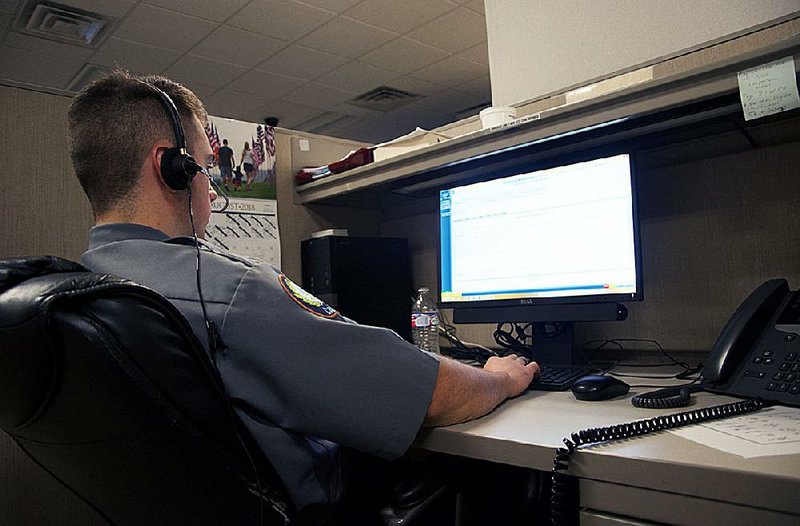Adam Ball grew up with his father's stories about police work and dreams of becoming a detective, but it was not until he became a cadet with the Little Rock Police Department's Telephone Reporting Unit that Ball said he learned what being an officer can really entail.
"It's humbling," Ball said. "I've always had a lot of respect for police work ... but I have a lot more respect now."
The unit employs 18- to 21-year-olds with an interest in becoming police officers to answer nonemergency calls at the department's communication center, write reports and train with experienced officers in a variety of fields.
Sgt. Dewana Phillips, a 24-year-veteran of the Police Department and sergeant of the unit, said the program aids in training recruits and alleviating the number of calls coming into the department's nonemergency communications center every day.
Officers who would otherwise be answering these nonemergency calls, Phillips said, can instead work on patrol or follow up on existing cases.
When they're not manning the desk, Phillips said the cadets go along with officers to, for example, the scene of an accident or train with K-9 units and learn about the day-to-day operations of a Police Department.
During his first ride-along, Ball said the officer he rode with responded to four possible burglaries and encountered several possible suspects.
"You just don't realize how fast things can go wrong," Ball said.
Phillips said the cadets -- six of them at the moment, though she hopes to see the number grow -- learn skills integral to becoming an officer such as report-writing, de-escalating situations, looking for details and familiarizing themselves with online databases and reporting systems such as Lexus Nexus and the Arkansas Crime Information Center.
"The part I like most about how we've stylized this is sometimes you get a new officer and they're a little apprehensive about the 'who, what, when, why, where' but these guys are asking those questions every day," she said. "They're getting a skill set that I think will be really good for them -- if they become law enforcement or not."
At 19, Ball will be one of the first students to leave the program as he becomes eligible for the police academy. Ball said working with the unit has, if anything, only made him more excited to follow in his father's footsteps.
"That hasn't changed a bit," Ball said. "I think I'm even more motivated."
Though the Little Rock Police Department has hosted cadet programs before -- the last one ending approximately 15 years ago -- Phillips said cadets have never been charged with the nonemergency call lines, so the department tested the program first with a group of officers on extended leave.
For approximately 10 months before the cadets started in March, these officers manned the call center and "worked out any of the possible kinks," Phillips said. When the cadets finally came on board, each was paired with an officer who could walk them through the process and aid them in their first days on the job.
"On their first day, these guys were not answering phones," Phillips said. "They were learning to write reports, learning to use our systems. They have really gone through a lot of training."
Cadets do not answer calls concerning assaults, bomb threats, domestic violence calls, major investigative calls, missing persons or any other calls that require immediate officer presence, she said.
Instead, their calls are limited to incidents without injuries or immediate danger, such as delayed theft reports, minor traffic accidents on private property, lost or stolen license plates or forgery reports.
Phillips said the goal is to train each cadet until he reaches 21 -- the age at which he can apply for the police academy.
"This is a paid position with our department," she said. "It's very much a real job for these guys."
Phillips, who spent five years working for dispatch before becoming a police officer, said her mix of experience aids in understanding both the call center's needs as well as the officers'.
"This profession takes a special person," Phillips said. "I can't wait to see the officers these young cadets become. Chief [Kenton] Buckner recently called it 'growing our own fruit,' and I think that's what we're doing."
Metro on 08/27/2018
